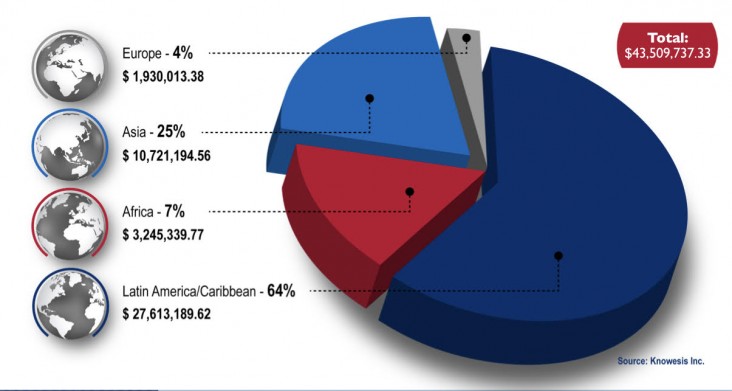- Work With USAID
- How to Work with USAID
- Organizations That Work With USAID
- Find a Funding Opportunity
- Resources for Partners
- Careers
- Get Involved
Speeches Shim
The Limited Excess Property Program provides Private Voluntary Organizations (PVOs) access to federal surplus property to support their humanitarian and development projects abroad. Federal surplus property is made available through the General Services Administration (GSA) and Defense Logistics Agency (DLA) Disposition Services' excess property programs. LEPP utilizes an innovative model of recovery and reuse to support a variety of development projects that promote sustainability in developing countries.
OVERVIEW
Since its inception in 1987, USAID’s Limited Excess Property Program (LEPP) has leveraged more than 700 million dollars’ worth of federal surplus property to help build and strengthen local institutions in USAID partner countries. LEPP partners utilize physical capital donations to respond to local needs ranging from disaster response to capacity building in over 40 countries in Africa, Asia, Eastern Europe, Latin America and the Caribbean.
LEPP partners have used federal surplus equipment and supplies to outfit hospitals, clinics, group homes, infant feeding centers, colleges, vocational facilities, and schools. In doing so, partners have augmented the impact of their development projects in the communities they serve. Furthermore, USAID Missions have utilized property acquired through LEPP for disaster response, capacity development, and to support local programs.
ANNUAL TRANSFERS
In FY 2019, LEPP successfully transferred close to 43 million dollars’ worth of federal surplus property to 14 developing countries. Surplus property worth $27,613,190 was donated to Latin America and the Caribbean, transferred to Chile, El Salvador, Guatemala, Haiti, Honduras, Jamaica, and Peru. Asia received $10,721,195 worth of property, transferred to Pakistan and the Philippines. Eastern Europe received $1,930,013 to benefit populations residing in rural areas in Albania, Bosnia-Herzegovina, Moldova, and Ukraine. Africa saw a 50% upsurge in property transfers at $3,245,340 to Tanzania.
Partner organizations that are faith-based accounted for approximately 50% of the federal surplus property transfers in FY 2019. Currently, LEPP collaborates with 23 PVOs, alongside 31 USAID Missions and three U.S. Embassies.

LEPP IMPACT
LEPP supports locally driven development endeavors, emergency aid, and rehabilitation efforts, in addition to promoting U.S. International public diplomacy through productive partnerships with host governments and local institutions.
LEPP partners acquire the federal surplus property through hundreds of GSA and DLA property holding locations worldwide. Although the humanitarian aid and development projects vary greatly in size, the impact of the surplus property is very significant. For example, laboratory diagnostic equipment and hospital beds were donated to the Kiboga General Hospital in Uganda, Kampala, to strengthen the hospital’s surgical, imaging, immunization, maternity and family planning services. Now the hospital can provide life-saving services to nearly 50,000 people in six surrounding districts who rely on the hospital as the only health care provider in the area.
Ophthalmology equipment was transferred to an eye clinic located on the remote island of Culion, the Philippines. As a result, doctors in Culion are now able to perform vision correction surgeries on residents of the island as well as patients who travel two to three hours by boat from the 41 surrounding islands to get care. In addition, the Palanca Community Center in Cantemir, Moldova, was supplied with computers, desks, blackboards, and school supplies through LEPP. Children in Cantemir often live in poor conditions and lack basic furnishings and spaces for studying, skill-building and productive interaction with peers. As a result of these donations, students can now do their homework at the center where they also receive free academic tutoring and have access to a library.
LEPP transfers of an industrial-size water autoclave and gynecological equipment have helped a clinic in Kingston, Jamaica, to provide dental, vision, hearing and HIV testing services. The clinic serves 7,300 patients in six low-income communities with limited access to health care. Thanks to LEPP donations, the center has also opened a free pap-smear clinic, the first of its kind in the community. Moreover, the College of Oral Health Sciences in Kingston received state of the art dental chairs and medical equipment through LEPP. These LEPP transfers have helped the college to expand dental services at an affordable cost, teach more students and support the country’s objective of retaining local talent to serve the surrounding communities.
For more LEPP updates, program impacts and success stories, please see the LEPP FY 2019 Annual Report and the LEPP Quarterly Newsletter .
LEPP APPLICATION PROCESS
To apply to LEPP, an organization must meet USAID's PVO self-certification criteria. Organizations applying to LEPP must complete and submit a PVO Self-Certification Form as part of their application package. Completion of this form solely indicates that the organization meets the conditions as a PVO. Please note that there are additional program requirements in the LEPP application.
|
STEP 1 |
Certified PVO submits an application by the participation request deadline of May 20, 2020. |
|
STEP 2 |
Technical Evaluation Committee reviews and makes a final decision on each application. PVO receives a notification of approval or denial. |
|
STEP 3 |
Approved PVOs sign official Transfer Agreement with the Bureau for Democracy, Conflict, and Humanitarian Assistance (DCHA)/American Schools and Hospitals Abroad (ASHA). |
|
STEP 4 |
Approved PVOs participate in LEPP's 607 Determination training via webinar. Program participation is contingent upon obtaining an approved 607 Determination from the country to which you plan to transfer surplus property. |
|
STEP 5 |
Attend mandatory in-person (or virtual, dependeing on the evolving federal and state guidelines on COVID-19) training in Washington, D.C. |
For more information on program participation and the 607 Determination process, please email the LEPP team at LEPP@usaid.gov.
RESOURCES AND USEFUL LINKS
Federal Transportation Programs
Federal Surplus Property Programs
- Defense Logistics Agency's (DLA)
- General Services Administration (GSA)
- General Services Administration (GSA) Federal Supply Codes

Comment
Make a general inquiry or suggest an improvement.